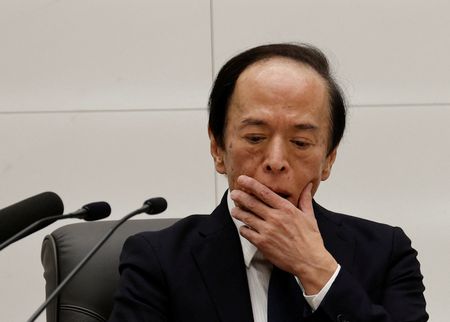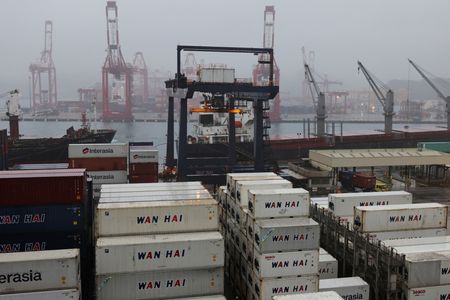By Leika Kihara
TOKYO (Reuters) -Bank of Japan Governor Kazuo Ueda said he wanted “just a bit more data” on next year’s wage-growth direction and warned of the boost a weak yen could have on underlying inflation, issuing the strongest signal yet on the chance of a December rate hike.
Ueda also told parliament on Friday the central bank will discuss at upcoming policy meetings the “feasibility and timing” of a rate hike, a change in tone from previous remarks that the bank had no preset idea on the timing of a policy shift.
The comments came as the yen’s slide to a 10-month low against the dollar raised pressure on Japanese policymakers to combat further declines in the currency that would inflate households’ cost of living.
Ueda said the BOJ must be mindful the weak yen could affect underlying inflation – a key gauge it looks at in deciding how soon to raise rates – by pushing up import costs and broader prices.
“Compared with the past, the impact of currency moves on inflation may have become bigger because companies have become more active in raising prices and wages,” Ueda said.
“We must be mindful that price rises, through such channels, could affect inflation expectations and underlying inflation,” he said, adding the BOJ will be vigilant about such currency-linked effects on domestic prices.
CHANGE OF TONE
The remarks contrast with those by BOJ officials previously describing the weak yen as having only a temporary impact on prices, rather than a long-lasting one that could affect public perceptions of future price moves.
They also followed comments from BOJ board member Junko Koeda on Thursday that the central bank must keep raising real interest rates given “relatively strong” price rises.
“The BOJ will likely raise rates in December,” said Takeshi Minami, chief economist at Norinchukin Research Institute, pointing to hawkish comments, including from Koeda.
“The government doesn’t want a weak yen and would tolerate a rate hike to combat declines in the currency,” he said.
The BOJ next meets for a policy meeting on December 18 and 19.
YEN FALL MAY EMBOLDEN HAWKS
The yen has slumped since dovish Prime Minister Sanae Takaichi took office last month on market bets that political pressure could cause delays in future BOJ rate hikes.
In a sign that the weak yen has become a pain point for Takaichi, her finance minister, Satsuki Katayama, on Friday signaled the chance of currency intervention to stem further yen falls.
The administration’s aversion to the weak yen could work in favour of BOJ hawks. Yen moves have historically been key triggers of BOJ policy changes including last year, when the central bank raised rates in July amid political calls for steps to combat the currency’s sharp declines.
Ueda reiterated there was no change to the BOJ’s stance of continuing to hike rates if the economy moves in line with its forecasts, adding that he expects underlying inflation to reach 2% from the latter half of fiscal 2026 through fiscal 2027.
When asked in parliament why the BOJ kept policy steady last month, Ueda said he wanted to take “just a bit more time” to scrutinise signs on whether firms will keep raising pay in next year’s wage talks with unions.
The central bank was still collecting relevant information, including from its branches nationwide, Ueda said.
After exiting a decade-long, massive stimulus programme last year, the BOJ raised rates twice, including in January. It has kept rates steady at 0.5% since then, even as consumer inflation has remained above its 2% target for over three years.
Many market players expect the BOJ to raise rates either next month or at a subsequent meeting in January.
(Reporting by Leika Kihara; Editing by Christian Schmollinger, Shri Navaratnam and Ros Russell)











